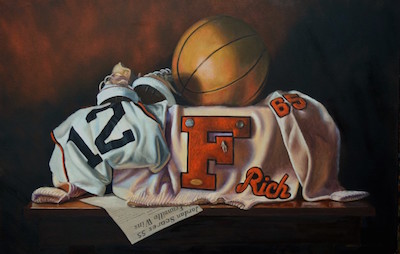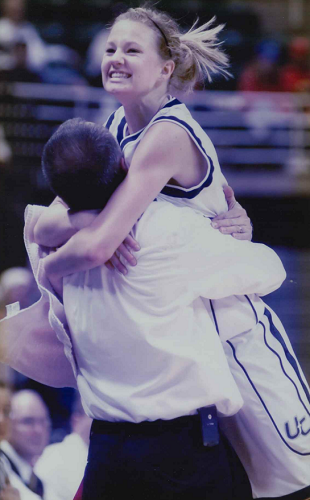
Film Fills In Picture of 'Fennville Flash'
By
Ron Pesch
MHSAA historian
December 28, 2017
We’ve been here before, but not in this way.
The last time was for a retrospective, covering one of the most impressive and awe-inspiring prep careers in Michigan high school history. That time was in print, and included a handful of still images that tried to illustrate the unbelievable.
But this time, the story is in documentary form. It’s woven together from grainy, scratched, faded silent film, a format of capturing memories familiar to thousands of people from generations past, as well as a series of modern-day high-resolution interviews.
Here, the basketball life of the athlete known as the “Fennville Flash” delivers on many levels. Yes, there is a Richie Jordan.
JordanVille, a documentary by John Mooy & Anne Colton, recalls a time when legend spread via word of mouth, newsprint and AM radio.
While it’s hard to comprehend for many today, the exploits of our athletic heroes were formed by “poets in the press box” who sat with pencil and paper, a typewriter, a microphone or a telephone, and described to their audience what they witnessed. On the receiving end, readers and listeners conjured up visualizations based on the facts, phrases and superlatives designed to create an image.
“Traveling left to right on your radio dial” helped listeners feel they were a member of the crowd, seated in the stands, in on the action and a witness to the mayhem. “Packed to the rafters,” reminded fans the importance of what was happening. An exciting game, presented by those with skill, created an event you longed to see. If a broadcast couldn’t be picked up on a transistor or tube radio, the final result might not be known, at the earliest, until the following day’s newspaper arrived.
I’ve told Jordan’s story via the MHSAA before; how he latched on to athletic training, weights and repetition to mold himself into a well-rounded athlete, able to leap to heights unexpected for a kid with a 5-foot-7 frame. The tales of his unfathomable accomplishments slowly leaked beyond the city limits of Fennville into Kalamazoo and greater Southwestern Michigan, then to Detroit. When Detroit Free Press writer Hal Schram relayed Jordan’s feats, the secret traveled across the state and beyond its drawn borders.
From there the legend of Jordan’s accomplishments grew. In Fennville, as in many small towns across the country, the city shut down when a game was played. The Jordan story was so enticing that thousands would travel vast distances to see him play with their own eyes. Today, his single season scoring average of 44.4 points per game during the 1964-65 campaign still remains the top mark in the MHSAA record book.
 JordanVille runs just shy of a half hour. Contained within is insight into the athlete that is challenging to relay in print form. Thanks to access to home movies and a series of interviews with Jordan, former teammates, past opponents and his high school coach, the determination, dedication and drive of a kid who wouldn’t let physical size be a deterrent from achievement radiates from the screen. On display is small town America at its finest, and perspective formed over 50+ years.
JordanVille runs just shy of a half hour. Contained within is insight into the athlete that is challenging to relay in print form. Thanks to access to home movies and a series of interviews with Jordan, former teammates, past opponents and his high school coach, the determination, dedication and drive of a kid who wouldn’t let physical size be a deterrent from achievement radiates from the screen. On display is small town America at its finest, and perspective formed over 50+ years.
For Mooy, it completes a filmmaking journey started six years ago. But the story of Jordan, in his eyes, date back to his school days. Mooy first heard about Jordan as a 7th-grader from a math teacher. A second-team all-St. Joseph Valley League selection, Mooy played at Marcellus High School and scrimmaged against Jordan and the Fennville Blackhawks.
He couldn’t believe his eyes.
“Everyone wanted to see this kid play,” said Mooy in 2011. “He was the first high school player I saw sign an autograph.
Today, with the interviews complete, and the film ready for viewing, Mooy sees more than just a sports story:
“With the benefit of years now passed, I look at the Rich Jordan story with a new respect. JordanVille created a place that was welcoming no matter who you were, or what color your skin happened to be. It was the 1960s. Rich was growing up Jewish, the Civil Rights Movement was in full swing, and the Vietnam War was on everyone's mind. And in Fennville, Michigan, from 1961 to 1965, the Jordan high school years, there were lessons beyond sports being learned by everyone that would last a lifetime. The Jordan household, under the guidance of (his parents) Tuffy and Sylvia Jordan, is where the story begins."
The film speaks of a time that has departed. Competition for our attention was less focused; phones hung on walls or sat on tabletops, communities were tighter, the training table featured peanut butter and chocolate milk instead of protein powder. A city could easily be renamed for a day.
The film also reminds us that those days were far from perfect.
If all goes as planned, the public will see the finished product come the flip of the calendar. In West Michigan, JordanVille is scheduled to show on New Year’s Day at 6 p.m. on WGVU, and will repeat on WGVU-Life at 7:30 p.m., Friday, Jan. 5.
Seek it out, and spread the word, just like in days of old.
 Ron Pesch has taken an active role in researching the history of MHSAA events since 1985 and began writing for MHSAA Finals programs in 1986, adding additional features and "flashbacks" in 1992. He inherited the title of MHSAA historian from the late Dick Kishpaugh following the 1993-94 school year, and resides in Muskegon. Contact him at [email protected] with ideas for historical articles.
Ron Pesch has taken an active role in researching the history of MHSAA events since 1985 and began writing for MHSAA Finals programs in 1986, adding additional features and "flashbacks" in 1992. He inherited the title of MHSAA historian from the late Dick Kishpaugh following the 1993-94 school year, and resides in Muskegon. Contact him at [email protected] with ideas for historical articles.
PHOTOS: (Top) Richie Jordan runs Fennville's offense during his thrilling high school career in the 1960s. (Middle) Jordan memorabilia, as captured by Bill Williams.

Energy, Competition, Moments & More Continue to Spark Unity Coach Soodsma
By
Steve Vedder
Special for MHSAA.com
February 15, 2023
HUDSONVILLE – The pep band is blaring the school fight song, the boisterous crowd of a couple of thousand fans has long grown weary waiting for the opening tip-off, and the antsy players are crowded behind the locker room doors ready to spring like a pack of lions.
It's like the scene from the epic basketball movie "Hoosiers" where coach Norman Dale pauses before entering a rollicking and packed Friday night gymnasium to mutter to himself, "Welcome to Indiana basketball."
Scott Soodsma not only grasps the significance of that scene firsthand, it's why after four decades he still loves coaching.
"The fierce competition, the band, your heart pounding like a dog – it's still like it was 30 years ago," said Soodsma, the Hudsonville Unity Christian coach and dean of West Michigan basketball coaches in his 41st season of a run that’s included two states and three schools.
"How does it get any better than that? I'm always telling the kids to live for the moment. You can't replace all that; I still get the shivers. I've had so many moments like that."
Among those highlight moments are being one of just two Michigan coaches to win both girls and boys MHSAA Finals championships (Paul Cook of Lansing Eastern was the other), and the moment he claims is easily No. 1 on his all-time personal list: coaching his daughter Amber as part of the 2006 Class B champ. Unity Christian also won a 2019 boys state title. He also won a third Finals championship with the boys at McBain Northern Michigan Christian.
Soodsma, 63, admits there have been myriad changes in coaching basketball since his first season at North Dakota's James Valley Christian High School in 1983 and coming to Unity Christian in 1993. For starters, players are bigger and stronger and are more schooled in the game through AAU and offseason programs. In addition, the influence of parents – for better or worse – has increased dramatically. As for the on-court game, Soodsma unabashedly admits he at first fought the institution of the 3-point shot. And the emphasis on winning has definitely only increased pressure on many coaches.
Soodsma, a member of the Basketball Coaches Association of Michigan Hall of Fame who ranks ninth on the state's all-time boys wins list with 635, said he's adapted to the times. He wants to win as much as he ever has, still broods for days after losses and still considers himself receptive to the changing Xs and Os aspect of coaching.
But where his booming voice routinely used to resonate loudly into the middle sections of the Unity Christian bleachers, most of those comments now are only audible to fans perched in the first couple rows of the stands. Which is probably a good thing, Soodsma adds sheepishly.
 Coaching, he readily contends, is still coaching – and winning still heads the list of priorities. He does add one disclaimer, however, in terms of winning. Whereas it used to be about a young coach building a resume through wins, it's now about what winning can do for today's teenager athlete. An old-school coach? Yeah, probably. But one who has learned much about himself, players and parents after 41 years.
Coaching, he readily contends, is still coaching – and winning still heads the list of priorities. He does add one disclaimer, however, in terms of winning. Whereas it used to be about a young coach building a resume through wins, it's now about what winning can do for today's teenager athlete. An old-school coach? Yeah, probably. But one who has learned much about himself, players and parents after 41 years.
"I've learned to enjoy the kids more; I'm definitely a different kind of person in the ’90s as opposed to now in the 2000s," he said. "I am a stubborn man, and it took a long time (to change). But winning? Oh, yeah. I've never backed down. The winning and losing hasn't changed, and I make no excuses that I still want to win."
Which is then strange, perhaps, that he doesn't list being just one of two coaches to win Finals titles in both girls and boys basketball as the zenith of coaching for 41 seasons. That honor goes to having his daughter, who went on to a stellar career at Dort College, on the state championship club.
"It's not that big of a deal," he said of being on the bench for what likely will never happen again as boys and girls basketball are now in the same season. "To me it's not an accomplishment I would rank (at the top). I'm just being honest. Winning a state title with Amber, and the picture I have of her and me in my office, that's the best."
How well has Soodsma adapted his coaching style over the years? Two people in a position to know offer their own opinions on the topic, including 22-year assistant Bruce Capel and Randy Oosterheert, who with son Rylan are the only father/son combination that Soodsma has coached.
"Scott has always been vocal on the sidelines as a coach. As I sit in the stands and watch as a spectator, same Scott," said Randy Oosterheert who played for Soodsma in 1992-93 and 1993-94 and whose son is a current Unity Christian player. "I will say that my son and I agree, if you do something wrong on the floor, he is the first person to greet you on the sidelines and point out your failure. However, if you do good, he is the first person to greet you on the sidelines and tell you good job.
"The latter is done at a little lower decibel level than the offense, and those with a watchful eye from up in the stands unfortunately (don’t) get to hear the praise, only the punishment. Scott is obviously very competitive, then and now. He expects a lot but gives a lot."
As far as the competitive side, Capel hasn’t seen much of a difference over their two decades together.
"Certainly, coaching is a lot different in how you approach kids from more than 20 years ago," he said. "There's a difference in society and you have to change with it, and he's done that. I don't think it's as much life and death with Scott anymore. But in terms of winning, I haven't seen that go away."
It's a coin flip as for how much longer Soodsma will be directing traffic from the sidelines. He broke into the top 10 among the all-time winningest boys coaches in Michigan history by passing Warren De La Salle's Bernie Holowicki and Ray Lauwers of Morley Stanwood last season. Next on the list is Big Rapids' Kent Ingles (644). When you factor in Soodsma's win total as both boys and girls coach, the 742-and-counting combined wins rank eighth in state history.
He does admit the desire to spend more time with wife Mary, the longtime away scorekeeper for the program, and 11 grandkids scattered from Denver to Seattle to San Diego. Retirement could strike when this season ends in March, or it could still be several Marches away. But when the end comes he anticipates making a contented transition from arguing with officials, coming to an "understanding" with parents and devising new Xs and Os. Soon, he mused, will come time for much-anticipated passions such as hunting, fishing and pickleball.
"For the first time I've contemplated it," he said. "There are a lot of things I'd like to do. I'm not a basketball junkie."
That may be true. But it'll still be tough to surrender those noisy pep bands, bright gymnasium lights and the din of Friday night crowds.
PHOTOS (Top) Hudsonville Unity Christian boys basketball coach Scott Soodsma stands in front of a portion of the school’s trophy case, which he’s helped fill over decades coaching basketball. (Middle) Soodsma and daughter Amber embrace during their team’s 2006 Class B Final victory. (Top photo by Steve Vedder. Middle photo courtesy of the Soodsma family.)

